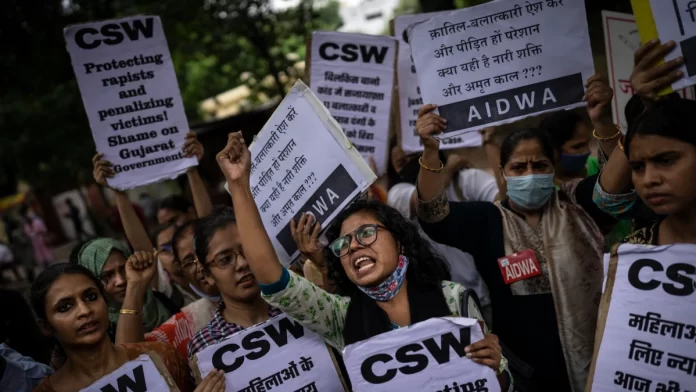United States Commission on International Religious Freedom USCIRF Vice Chair Abraham Cooper: “USCIRF strongly condemns the early and unjustified release of 11 men sentenced to life in prison for raping a pregnant Muslim woman and committing murder against Muslim victims during the 2002 Gujarat Riots.”
USCIRF Commissioner Stephen Schneck: “The failure to hold accountable perpetrators of the 2002 Gujarat Riots who committed physical & sexual violence is a travesty of justice. It’s part of a pattern of impunity in India for those engaged in violence against religious minorities.”
Bilkis Bano was five-months pregnant when she was attacked by a Hindu mob in 2002 as anti-Muslim violence gripped the western Indian state of Gujarat.
Bano, then 21, was gang-raped by sword-wielding men from her neighborhood. Fourteen of her family members were killed, including her 3-year-old daughter, who was snatched from her arms and bashed against a rock.
This week, 11 men serving a life sentence for the crimes were released from prison on remission by the Gujarat state government, sparking widespread outrage and an emotional appeal for justice from Bano.
In a statement issued Wednesday through her lawyer, Bano said the news left had her “numb” and “bereft.”
“I trusted the system, and I was learning slowly to live with my trauma,” she said, adding that the release had shaken her faith in the justice system. “No one enquired about my safety and well-being before taking such a big and unjust decision.”
The development comes as a shock to the country that has struggled to address widespread sexual violence against women. In recent years, authorities have made laws stricter and instituted harsher punishments, but conviction rates for rape remain low.
Women’s rights groups said that the release of the perpetrators on Aug. 15, an anniversary of the country’s 75 years of independence, was a blow to every rape victim.
“It shames us that the day we should celebrate our freedoms and be proud of our independence, the women of India instead saw gang-rapists and mass murderers freed as an act of State largesse,” the groups said in a statement.
It was also a setback for survivors of the Gujarat riots, who have fought long and hard for justice. The riots erupted in 2002 after a train fire blamed on Muslims killed a group of Hindu pilgrims. More than 1,000 people were killed in days of vigilante violence that followed, most of them Muslims. Narendra Modi, the chief minister of Gujarat at the time, is now India’s prime minister. Under his Hindu nationalist Bharatiya Janata Party, or BJP, hate speech and violence against Muslims has risen sharply.
The men released this week have received a hero’s welcome. In one video from outside the prison, they are given sweets. Local media said the men were later honored with garlands by members of Hindu nationalist groups affiliated with the BJP.
Sujal Mayatra, the official who led the panel in Gujarat that recommended the men’s release, said the decision was based on various factors.
“They had completed 14 years of tenure. We enquired about their conduct and parole time,” he said. “The nature of crime and victim’s safety was also taken into consideration.”
In India, life sentences are meant to last until death, but convicts are eligible to seek early release after 14 years. While the latest remission policy says those convicted of rape and murder cannot be released prematurely, the policy at the time of the Bano case did not make that distinction.
In a 2017 BBC interview, Bano said she was fleeing the violence in a group of 17 that included her mother and young siblings in March 2002 when a mob accosted them.
Besides raping Bano and killing her daughter, the men gang-raped her cousin before murdering her and her 2-day-old baby. Bano was one of only three people from the group to survive the massacre.
Human rights lawyer Vrinda Grover, who has been part of efforts to reform legislation on violence against women, described the government’s decision as “grossly arbitrary and discriminatory.”
“The mask of the government being concerned about sexual violence against women has slipped. This is a majoritarian state signaling impunity for hate crimes,” she said.
Bano’s case took years to work its way through the Indian justice system, finally resulting in convictions in 2008. All the while, she was a target of death threats, forced to move frequently and live in hiding.
In 2019, India’s Supreme Court ordered the state government to pay about $62,000 in compensation to Bano, noting that she had been forced to live like a “nomad” and an “orphan.”
Now, her family feels like they are back at square one.
“The battle we fought for so many years has been wrapped up in one moment,” Yakub Rasool, Bano’s husband, told the Indian Express.
Bano, in her statement, said that her grief was not hers alone “but for every woman who is struggling for justice in courts.”
“Give me back my right to live without fear and in peace,” she said.
Courtesy: Washington Post




